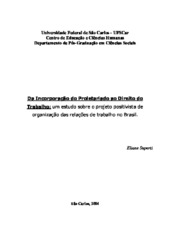Da incorporação do proletariado ao direito do trabalho: um estudo sobre o projeto positivista de organização das relações de trabalho no Brasil.
Abstract
The present study had as an objective a greater understanding of the problems related to
the Social Issue in Brazil. Among the other aspects of this theme, we focus the
ideological and political process of elaboration of the positivist project of organization of
the work relations, looking for to understand to which extent certain positivist ideals of
this project had been incorporated and making up the historical construction of national
labor law. Within the set of comtian positivist theory, the ideal of proletariat
incorporation into the modern society occupies a core position intrinsically entailed to
the political realization of the theory. According to Comte, become the working class
integrated part of the capitalist society used to imply realizing the deep moral reform in
the political and economic concepts proposed by positivism, reorganizing the society to
the extent that turns harmonious the relations between the capital and work. In Brazil,
the national positivists claim that the solution for the working issue had such a first
challenge overcome the slavery. But the problem could not be solved simply with the
abolition, it was necessary a project which integrated the former slavers into the society.
Reforming the positivist theory by Augusto Comte from the national needs, the Brazilian
positivists made up to the nation a reorganizing project of the working relations, which
embraces a large proposal of social reform. Getting a spot in Rio Grande do Sul, such a
theory was given an important political expression through Júlio de Castilhos and Borges
de Medeiros period of governorship, reaching out the 1907 generation that took part
in the revolution of 1930, and led by Getúlio Vargas assumed the pos-revolutionary
government. The State configuration from 1930 revealed the assimilation of the positivist
ideas of the proletariat incorporation, the social harmony, and the collaboration among
the classes. The positivist project if constitutes, thus, in an important source of the
ideological inspiration about the working right in Brazil.
